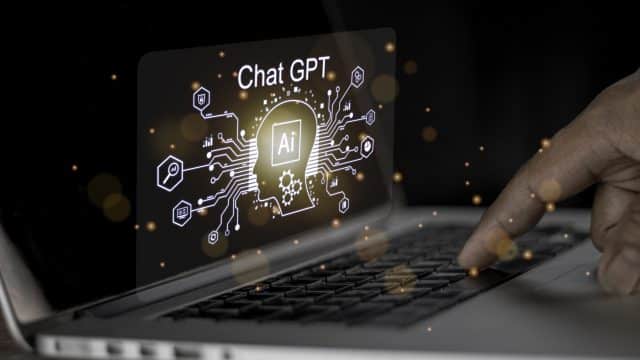Opportunities and considerations for small businesses experimenting with ChatGPT

For the past few months, the tech -- and tech-adjacent -- world has been fascinated by ChatGPT. A generative artificial intelligence (AI) tool that has been open for public use since late 2022, it’s designed to interact with humans to answer questions or develop content based on a prompt written in simple, conversational English rather than a complex data query.
ChatGPT has been used to write Valentine’s Day poems, plan a Thanksgiving menu and write other humorous outputs. It also has quickly become a research hub, programming tutor and source for writing inspiration. Famously, a leading tech news site used ChatGPT to write some of its articles, to varying degrees of success.
What is ChatGPT
For those who don’t follow AI news closely, ChatGPT leverages natural language processing (NLP) to understand, create and manipulate human language. That might sound like something for only the most technical among us. But chances are you’ve probably used NLP without realizing it. Alexa, Cortana and Siri all use NLP. So do those pop-up "How Can I Help You?" website chatbots. As do other everyday tools like spellcheck, web search and services that translate text or speech.
While ChatGPT rapidly attracted attention for its ability to answer nearly any question quickly and comprehensively in grammatically correct text, it also received criticism for its tendency to feature misinformation pulled from the web without flagging it as such. Microsoft, which incorporated ChatGPT into its Bing search engine, was prompted to limit the number of questions per session following reports that the results veered into unsettling territory.
From a small business perspective, it might be tempting to write ChatGPT off as something for larger organizations or ones with more resources. The fact is that ChatGPT can be an effective support tool for businesses of all sizes if you understand its strengths and limitations.
Opportunity #1: Project organizer
ChatGPT produces natural responses to various questions and prompts. This capability makes it a good starting point when organizing a new project. For example, for many people sitting in front of a blank page at the start of a project is overwhelming. Asking ChatGPT a question about the main theme generates what could serve as a framework or outline for your work. The key, however, is to be clear and detailed in your initial prompts to the chatbot to yield better results. Some research has demonstrated enormous differences in responses when you assign ChatGPT with a role and duties. For example, at the start of your interaction with ChatGPT, tell it to "act as a web designer organization," and that "you will ask it many questions about how best to approach the creation of new site and ecommerce."
Opportunity #2: Virtual brainstorm partner
A conversation with ChatGPT could even be useful in mapping out the pros and cons of an idea, or building on existing ideas in a way you might do with a room full of experts during a brainstorming session. This is not to say that anyone should pass off AI-written content as their own. As we have seen in educators’ debate over generative AI’s role in the classroom, there are a number of tools available to determine whether a text has been written by a bot, and these tools are likely to be incorporated into word processing programs and other software eventually.
Opportunity #3: Coding and debugging
In addition to delivering human-like responses and content, ChatGPT is also becoming humans’ best friend when it comes to technical processes such as coding. Recent research found that ChatGPT is effective to help spot and fix bugs in code due to its ability to offer "a dialogue system through which further information, e.g., the expected output for a certain input or an observed error message, can be entered." This is critical for short-staffed SMB owners who may not have a dedicated tech team and need to troubleshoot issues with their systems independently.
Concern #1: Denial, the biggest risk
One of the biggest risks for small businesses and generative AI is to deny it exists. It’s tempting to focus on these platforms’ current limitations and assume that the industry or governments will set ethical standards or pass legislation to set parameters for their use. The technology is clearly here now and accessible to you, your customers, your partners, your competitors and, unfortunately, even hackers writing phishing emails. Small businesses must determine how and where to incorporate ChatGPT and tools like it into their workflow, and what impacts.
Concern #2: AI as colleague, not competition
The next concern for many people is, "will this make my job obsolete?". While ChatGPT was greeted with alarm by some who fear that it would put different types of careers in jeopardy, from customer service to content creation to coding, it is far more likely that generative AI will become another tool used by professionals in all fields to handle mundane, repetitive tasks, but also as a tool to make people better, faster and more innovative in their roles.
Concern #3: IP and copyright cautions
From a legal perspective, ChatGPT and the text it generates raise quite a few questions about potential copyright violations and infringement of intellectual property. Who "owns" the output of a ChatGPT query remains an unanswered question. And, because ChatGPT was trained on information posted to the internet by a wide array of individuals and organizations, there is a risk that its output could present others’ content as its own.
ChatGPT is an amazing technological development that will find its appropriate role in the business world. Small businesses that want to test this emerging category could very well find it will contribute to their competitive advantage -- even against larger rivals.
Image credit: [email protected]/depositphotos.com
Jim Chilton is General Manager of Infosec Institute and CTO of Cengage Group.